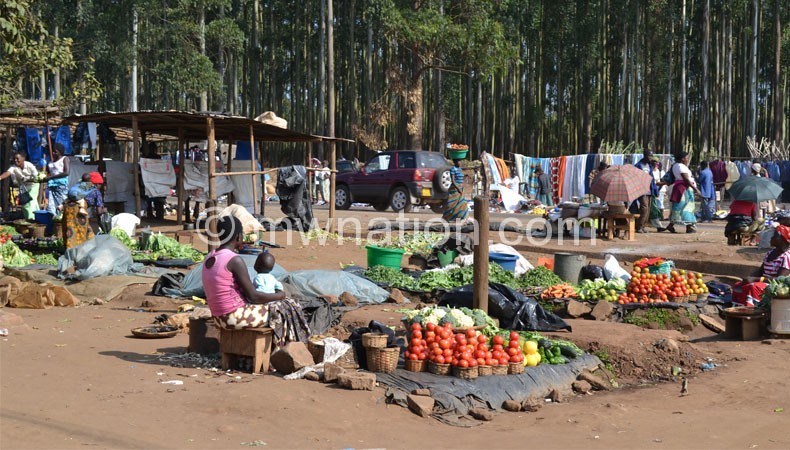The chaos that is in markets
Despite paying a K100 market fee for selling bananas at Dyeratu Market every day, Lucy Javelo, 39 of Traditional Authority (T/A) Thomas in Thyolo can hardly access facilities such as toilets and water at the market. The market fee is remitted to Chikwawa District Council.
Like many other business people selling their merchandise at the district councils markets, Javelo is at risk of contracting waterborne diseases such as cholera and diarrhoea due to poor sanitation.
 “The council is not doing enough to assist us. They collect market fees every day but we don’t know where the money goes. One would think they would use it for making the environment habitable. We usually walk long distances to access toilets,” says Javelo.
“The council is not doing enough to assist us. They collect market fees every day but we don’t know where the money goes. One would think they would use it for making the environment habitable. We usually walk long distances to access toilets,” says Javelo.
She revealed that she has noticed several people who patronise the market, urinating close by her selling area which is under trees.
“Because we do not have toilets, people relieve themselves anywhere. Some even urinate on the trees close to our selling point, leaving a stench. But because there are no toilets in the market we cannot blame them,” laments the banana seller.
Basikolo George, a fish monger, agrees.
“We pay market fees every day, but the council cannot even provide the market with rubbish pits or bins. At least they should prioritise basic facilities such as toilets and water taps as they are crucial to our everyday survival,” said the fish seller.
Walking through the tight corners of the shop buildings, stench from urine and garbage that is carelessly disposed of engulfs the atmosphere.
During the day, people are seen flocking out of a video showroom located within the market area to urinate on the walls of the building.
“We cannot blame them because they have nowhere to go to answer the call of nature,” says Hope Thungula, a 28-year-old cell phone repaierer at the market.
In a letter dated 30 April 2014 and addressed to the Chikwawa District Council, Dyeratu Market users’ committee state that starting from May 5 this year, market sellers will no longer pay market fee if the conditions at the market do not improve. The letter was copied to Chikwawa Police Station Officer in-Charge, the District Health Officer, Traditional Authority Katunga, village head Sadula and Katunga Area Development Committee.
In the letter, the sellers cited failure of the council to fulfill promises it made.
“During the meeting we held with the district commissioner on April 23 2013 the council promised us that before 26 April this year, water would be restored at the market and market paths would be constructed. But all these have not been done. We feel we have been betrayed for a long time. We are, therefore, informing you that from 05 May, 2014, we will no longer pay market fee until our problems are resolved,” reads part of the letter.
The committee’s chairperson Matiya Banda said diseases such as diarrhoea and cholera are common among the sellers because of lack of toilets and running water in the market.
Banda said people eat fruits without washing them because there is no water.
Dyeratu is not the only market in the Lower Shire Valley experiencing these challenges. A visit to Nchalo, Ngabu, Chapananga and Nsanje exhibited the same challenge.
The Universal Declaration of Human Rights establishes access to clean and potable water as fundamental human rights.
Information sourced from www.wateraid.org, indicates that 2.4 million people in Malawi do not have access to safe water and over 7 million do not have access to adequate sanitation. WaterAid further indicates that over 3 500 children die every year from diarrhoea caused by unsafe water and poor sanitation in the country.
Water for People, one of the organisations operating in the area, aims at broadening access to safe water among residents in the area.
The project officer Andrew Chapola said his organisation is making strides in helping people access safe water.
Chapola says they have provided Chikwawa District Council with funds to sink boreholes in markets such as Dyeratu.
“The approach that our organisation is using is a decentralised one. We do not directly implement the water provision exercise. We work with district councils to identify the needs and we provide the funding,” he said.
Chapola said the organisation has so far pumped in K100 million for water provision in the district.
“Just last month, we released K34 million for logistics alone,” he said.
However, Chikwawa district commissioner Alex Mdoko said the provision of water and toilets in the market is very expensive since the fees collected as a market fee is too small to meet costs.
“Council’s markets are no longer operating as commercial ventures, the money we realise from market collection fee is not enough even to pay fee collectors’ salaries, but we are trying our best to provide toilets and put collection services in some markets,” Mdoko says.
He says the biggest challenge with water in the markets is that people misuse the facilities due to lack of ownership.






In other words, Mdoko has taken the money paid by the vendors and the K100M ear marked specifically for this site and pocketed it in another round of corruption Seems to be the great trend exposed during the last year. NGOs need to be the operating organization, not handing money to the councils. It is pocketed if you do so, not spent to benefit the people. Same each time and history proves the case with this department.
Maybe after we have Councillors in place after the election results they can take ownership and act on these vital issues. Good article – let us keep monitoring what happens.